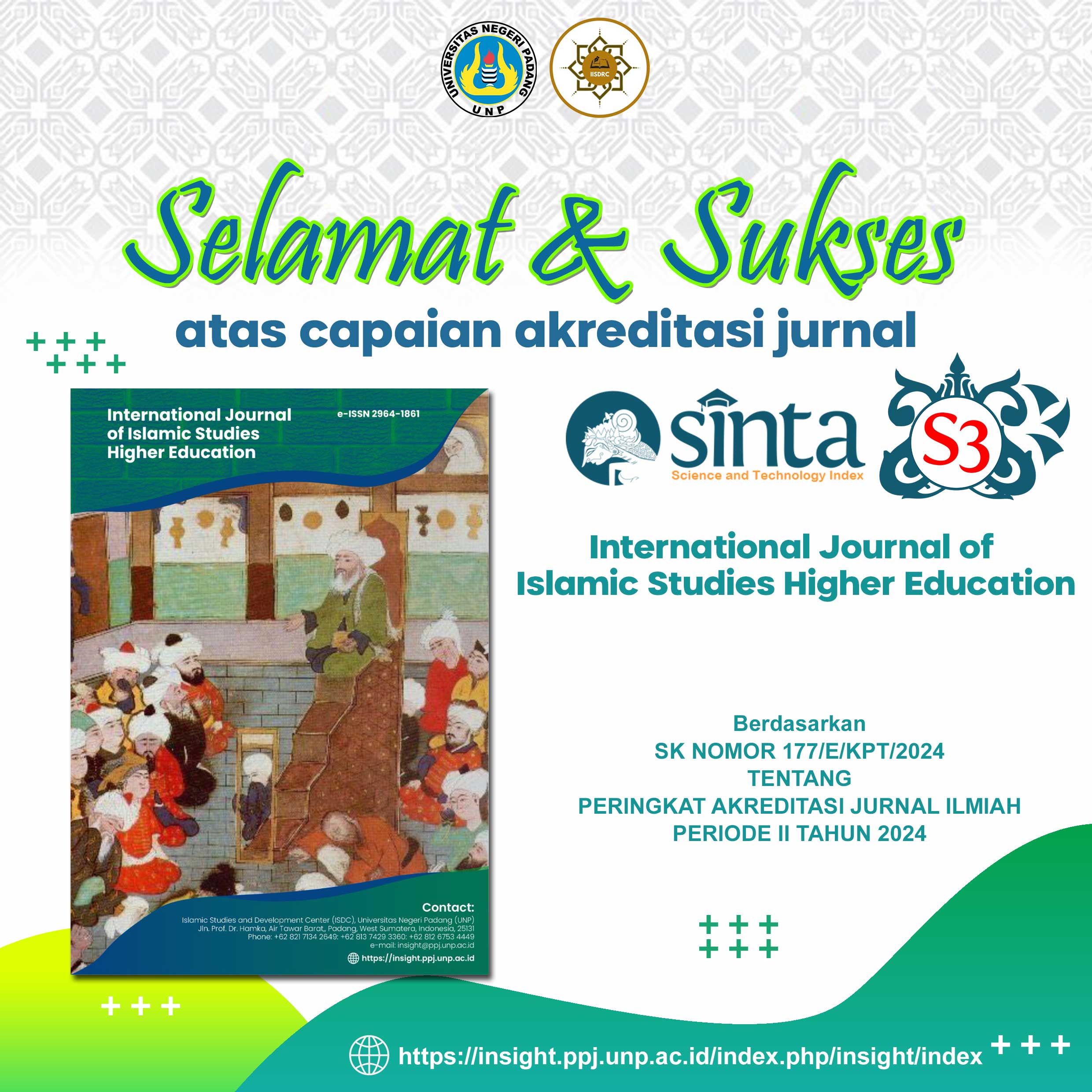Divorce of Intoxicated Persons in the Islamic Jurisprudence and Afghan Civil Law: An Inductive and Analytical Juridical Study
DOI:
https://doi.org/10.24036/insight.v2i1.141Keywords:
Divorce of intoxicated persons, Islamic jurisprudence, Afghan civil law, analytical juridical studyAbstract
The phenomenon of divorce in the context of intoxication has drawn limited scholarly attention, necessitating an exploration of its legal implications and theoretical underpinnings. This study employs an inductive and analytical approach, structured into an introduction, three main sections, and a conclusion that encompasses the research findings. The study synthesizes primary legal sources from Islamic jurisprudence, including the Quran and Hadith, alongside relevant provisions of the Afghan Civil Code and pertinent case law. Through a comprehensive examination of Islamic principles and legal precedents, the research delves into the multifaceted issue of divorce within the context of intoxication, addressing pertinent questions regarding the legal capacity and consent of an intoxicated individual to initiate or accept divorce. The analysis also investigates the rights and protections afforded to both parties in such circumstances, considering the overarching objectives of Islamic family law. The study highlights the varying approaches between Islamic jurisprudence and Afghan civil law, identifying potential areas of harmonization or conflict. Drawing on case examples and hypothetical scenarios, the paper further contextualizes the theoretical findings and proposes possible legal reforms to address the complexities arising from the divorce of intoxicated individuals. Ultimately, this research contributes to a deeper understanding of Islamic family law and its application in Afghanistan, while shedding light on the challenges posed by intoxication in the divorce context. The findings of this study may inform legal practitioners, policymakers, and scholars seeking to promote justice, equity, and protection within the realm of family law in both Islamic and Afghan legal systems.
References
Adiasih, N. (2017). Analisis Terhadap Putusan Pengadilan Dalam Perkara Perdata Yang Hukumnya Tidak Ada atau Hukumnya Tidak Jelas. Jurnal Hukum PRIORIS, 6(1). https://doi.org/10.25105/prio.v6i1.1909
Ahmad, F. (2003). Understanding the Islamic Law of Divorce. Journal of the Indian Law Institute, 45(3/4), 484–508. https://www.jstor.org/stable/43951877
Azzahra, A., Shadrina, S., Wardana, G. A., Yandrizal, D., & Hasim, R. (2021). Islamic Education and Concept of Gender Using a Culture Approach in Minangkabau. Khalifa: Journal of Islamic Education, 5(2), 155. https://doi.org/10.24036/kjie.v5i2.129
Bani, L. M., & Pate, H. A. (2015). Dissolution of Marriage ( Divorce ) under Islamic Law. Journal of Law, Policy and Globalization, 42, 138–143. https://core.ac.uk/download/pdf/234650383.pdf
Daud, F. K., & Syarif, N. (2021). Hak Cerai Perempuan Dalam Hukum Keluarga Islam Maroko. Al-Ahwal: Jurnal Hukum Keluarga Islam, 14(2), 159. https://doi.org/10.14421/ahwal.2021.14204
Fernando, R., Hasanuddin, T., Rangga, K. K., & Utama, D. D. P. (2022). Professional Mosque Management Model Based on Religious and Academic Activities in the Community. Khalifa: Journal of Islamic Education, 6(2), 196. https://doi.org/10.24036/kjie.v6i2.275
Haeratun, H., & Fatahullah, F. (2022). Efektivitas Mediasi Sebagai Alternatif Penyelesaian Perkara Perceraian di Pengadilan Agama. Batulis Civil Law Review, 3(1), 29. https://doi.org/10.47268/ballrev.v3i1.930
Hasbi, R., & Hasbi, S. (2016). the Legality of Divorce in the Perspective of Hadith. Jurnal Ushuluddin, 24(1), 51. https://doi.org/10.24014/jush.v24i1.1526
Herawati, T., Pranaji, D. K., Pujihasvuty, R., & Latifah, E. W. (2020). Faktor-Faktor yang Memengaruhi Pelaksanaan Fungsi Keluarga di Indonesia. Jurnal Ilmu Keluarga Dan Konsumen, 13(3), 213–227. https://doi.org/10.24156/jikk.2020.13.3.213
Hifni, M., & Banten), (Mahasiswa Pascasarjana IAIN SMH. (2016). Hak Asuh Anak Pasca Perceraian Suami Istri dalam Perspektif Hukum Islam. Bil Dalil, 1(1), 1–32. https://doi.org/10.32678/bildalil.v1i02.123
Jafar, A., & Ardha, D. J. (2022). Sistem Pembagian Waris Menurut Adat Bugis dalam Perspektif Hukum Islam di Kecamatan Banyuasin II Kabupaten Banyuasin. Jurnal Ilmiah Universitas Batanghari Jambi, 22(3), 1932. https://doi.org/10.33087/jiubj.v22i3.2815
Novebri, N., & Pratiwi, R. (2021). Peran Tokoh Agama Dalam Pencegahan Konflik di Tengah Masyarakat Multikultural Pada Era Digital. Khalifa: Journal of Islamic Education, 5(2), 198. https://doi.org/10.24036/kjie.v5i2.185
Rahawarin, Y., Darakay, J., Rumlus, C., & Manuputty, F. (2021). The Role of the Latupati Institution in Overcoming Religious and Social Conflicts in Maluku in 1999. Khalifa: Journal of Islamic Education, 5(1), 93. https://doi.org/10.24036/kjie.v5i1.175
Rahmah, S. (2021). Akhlak dalam Keluarga. Alhadharah: Jurnal Ilmu Dakwah, 20(2), 27. https://doi.org/10.18592/alhadharah.v20i2.5609
Rosmita, R., Fatimah Sahrah, & Nasaruddin, N. (2022). Konsep Keluarga Sakinah dalam Al-Qur’an dan Implementasinya dalam Kehidupan Rumah Tangga. BUSTANUL FUQAHA: Jurnal Bidang Hukum Islam, 3(1), 68–80. https://doi.org/10.36701/bustanul.v3i1.523
Schulenberg, J. L. (2016). Police Decision-Making in the Gray Zone: The Dynamics of Police–Citizen Encounters With Mentally Ill Persons. Criminal Justice and Behavior, 43(4), 459–482. https://doi.org/10.1177/0093854815606762
Sumanto, D., Samsudin, T., & Amirudin, F. H. A. (2021). The Existence of the Religious Court in Handling Divorce Cases on the Reason of Domestic Violence. Jambura Law Review, 3(2), 214–230. https://doi.org/10.33756/jlr.v3i2.11651
Downloads
Published
How to Cite
Issue
Section
License
Copyright (c) 2023 Aminullah Poya, Bouhedda Ghalia, Mohd Afandi Bin Awang Hamat

This work is licensed under a Creative Commons Attribution-ShareAlike 4.0 International License.











